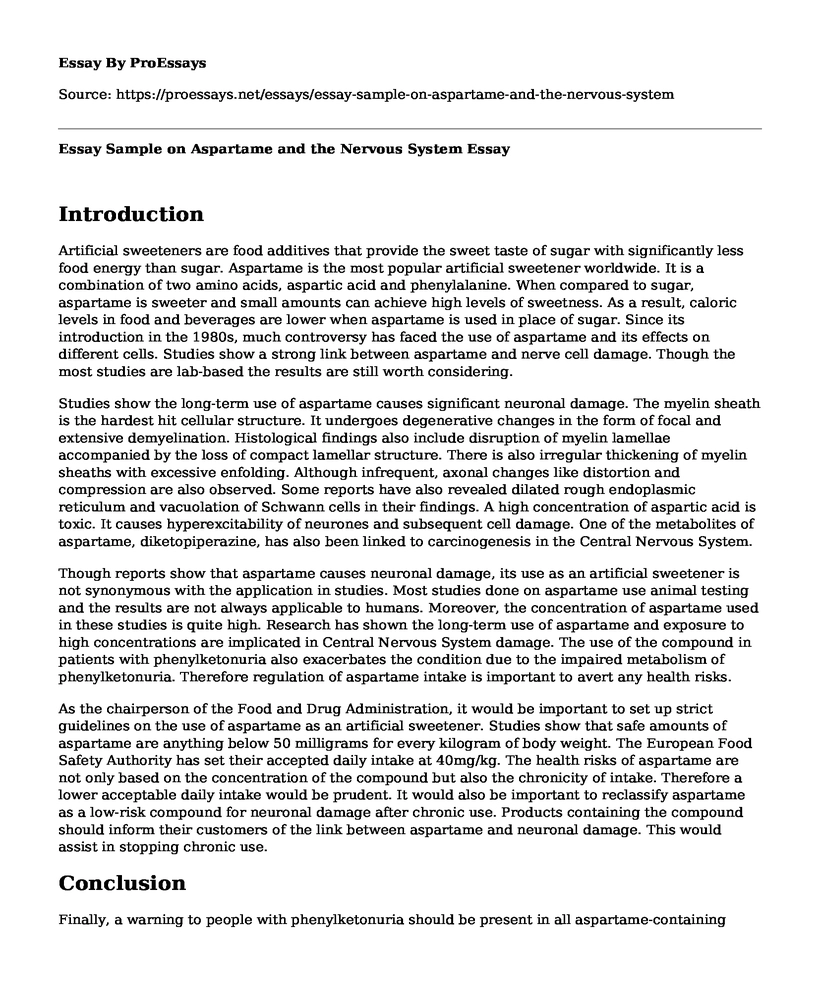Introduction
Artificial sweeteners are food additives that provide the sweet taste of sugar with significantly less food energy than sugar. Aspartame is the most popular artificial sweetener worldwide. It is a combination of two amino acids, aspartic acid and phenylalanine. When compared to sugar, aspartame is sweeter and small amounts can achieve high levels of sweetness. As a result, caloric levels in food and beverages are lower when aspartame is used in place of sugar. Since its introduction in the 1980s, much controversy has faced the use of aspartame and its effects on different cells. Studies show a strong link between aspartame and nerve cell damage. Though the most studies are lab-based the results are still worth considering.
Studies show the long-term use of aspartame causes significant neuronal damage. The myelin sheath is the hardest hit cellular structure. It undergoes degenerative changes in the form of focal and extensive demyelination. Histological findings also include disruption of myelin lamellae accompanied by the loss of compact lamellar structure. There is also irregular thickening of myelin sheaths with excessive enfolding. Although infrequent, axonal changes like distortion and compression are also observed. Some reports have also revealed dilated rough endoplasmic reticulum and vacuolation of Schwann cells in their findings. A high concentration of aspartic acid is toxic. It causes hyperexcitability of neurones and subsequent cell damage. One of the metabolites of aspartame, diketopiperazine, has also been linked to carcinogenesis in the Central Nervous System.
Though reports show that aspartame causes neuronal damage, its use as an artificial sweetener is not synonymous with the application in studies. Most studies done on aspartame use animal testing and the results are not always applicable to humans. Moreover, the concentration of aspartame used in these studies is quite high. Research has shown the long-term use of aspartame and exposure to high concentrations are implicated in Central Nervous System damage. The use of the compound in patients with phenylketonuria also exacerbates the condition due to the impaired metabolism of phenylketonuria. Therefore regulation of aspartame intake is important to avert any health risks.
As the chairperson of the Food and Drug Administration, it would be important to set up strict guidelines on the use of aspartame as an artificial sweetener. Studies show that safe amounts of aspartame are anything below 50 milligrams for every kilogram of body weight. The European Food Safety Authority has set their accepted daily intake at 40mg/kg. The health risks of aspartame are not only based on the concentration of the compound but also the chronicity of intake. Therefore a lower acceptable daily intake would be prudent. It would also be important to reclassify aspartame as a low-risk compound for neuronal damage after chronic use. Products containing the compound should inform their customers of the link between aspartame and neuronal damage. This would assist in stopping chronic use.
Conclusion
Finally, a warning to people with phenylketonuria should be present in all aspartame-containing products. Evidence shows that aspartame use in such patients worsens their condition. Every manufacturer of food or beverages containing aspartame should indicate accurately the amount of aspartame in their products. This is to help individuals keep a food journal of their daily intake. The strong association between aspartame and neuronal damage is worth paying attention to. As further studies on the subject continue we can only confirm, excessive use and long-term use are bad for human health. Therefore, it is necessary for aspartame intake to be regulated.
Cite this page
Essay Sample on Aspartame and the Nervous System. (2022, Jul 01). Retrieved from https://proessays.net/essays/essay-sample-on-aspartame-and-the-nervous-system
If you are the original author of this essay and no longer wish to have it published on the ProEssays website, please click below to request its removal:
- Health Sector's Cooperation with External Agencies - Essay Sample on Public Health
- Research Paper on Eating Yoghurt for Yeast Infection
- The Role of BSN and ADN in Patient Safety Outcomes and the Differences Between DNP and PhD
- The Causes and Effects of Stroke Condition on a Client Paper Example
- Evidence-Based Medicine in Depression Essay Example
- Preparing for Pregnancy: What to Know About Conception & Childbirth - Essay Sample
- Essay Example on Diabetes: Type 1 and Type 2 Overview







